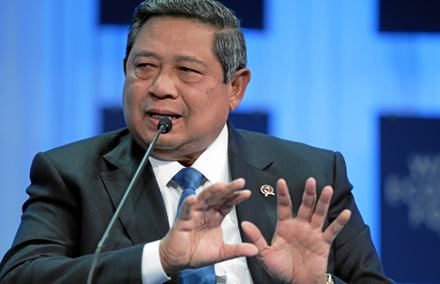The Yudhoyono years are a mix of good outcomes and bad policy, write Stephen Howes and Robin Davies.
The theme for this September’s ANU Indonesia Update is “The Yudhoyono Years: an assessment”. We have just written the August “Survey of Recent Developments” for the Bulletin of Indonesian Economic Studies. In it, among other things, we provided a retrospective on the outgoing president and parliament, from 2009 to 2014. We could only develop a few preliminary ideas, but, to help get the discussion going, here they are.
A useful starting point is to compare Indonesia’s performance against the targets President Susilo Bambang Yudhoyono (SBY) set in his 2010-14 National Medium-Term Development Plan.
As in his first term (assessed here), SBY cannot report that his targets have been fully achieved, but he can certainly point to considerable progress in important areas. Our assessment is that five of his main targets were mainly achieved (growth, poverty, unemployment, inflation, and infant mortality), two were partly achieved (life expectancy and literacy) and three were not achieved (agricultural production, corruption, and democracy).
Indonesia looks especially good from an international perspective: its economic growth over the last five years was the fourth highest in the G20, though it was helped more than most countries by China’s demand for energy and mineral resources. Poverty in Indonesia has fallen consistently and significantly, though it would have fallen more had the same rate of growth been achieved with a smaller increase in the level of inequality. The share of Indonesia’s richest 20 per cent in total household expenditure rose from 42 per cent at the start of Yudhoyono’s first term to 49 per cent at the end of his second.
SBY is the first president in Indonesia’s brief democratic era to serve out a full term, let alone two. It was not so long ago that a democratically elected president, Abdurrahman Wahid, was impeached by parliament in questionable circumstances and removed from office under threat of action by the Indonesian military.
Not that everything is rosy today in Indonesia’s body politic. The drop in its Democracy Index score reflects a perceived regression in the treatment of religious minorities. Nevertheless, a major positive legacy of SBY’s two terms in office is the entrenchment of a vibrant democracy.
Earlier in his second term, SBY’s failure to prosecute an anti-corruption agenda was much commented on. With Indonesia’s Corruption Eradication Commission increasingly going after very high-profile accused, progress in this area now looks more encouraging. However, Indonesia’s rating in the international Corruption Perceptions Index has only improved marginally and by nowhere near enough to hit the president’s target. Its relative ranking has actually slightly declined. For a radical reduction in corruption, more political leadership will be required to complement the enhanced investigatory effort.
SBY’s second-term economic reform record is not impressive, especially given the strong mandate given to him. We focused in our survey on trade and fiscal policy. On the former, protectionism and economic nationalism reasserted themselves during his second term, particularly in agriculture and mining.
Not all of the blame for this can be sheeted home to the President. Indonesia also has an active parliament. Over the last five years, Indonesia’s parliament passed five important pieces of legislation governing agriculture, industry and trade: Law 13/2010 on Horticulture, Law 18/2012 on Food, Law 19/2013 on the Protection and Empowerment of Farmers, Law 3/2014 on Industry, and Law 7/2014 on Trade. As we show in our survey, all these laws either mandate or authorise a protectionist approach to economic policy-making. They allow varying degrees of flexibility, but all provide a basis on which any trade, industry or agriculture minister so inclined could build a policy package of high tariffs, quotas, or both.
The food and farmers laws are the most clearly protectionist: the former makes self-sufficiency the objective of government, and the latter requires the government to prop up agricultural prices. The United States and New Zealand have complained that the horticulture law violates Indonesia’s WTO commitments, and the European Union has suggested that the trade and industry laws do the same. The Indonesian government will continue to be constrained by international commitments and public outcries against high food prices, but it will also be under pressure to implement what is now the law of the land.
Though Indonesia’s parliament is often portrayed as fractious, its legislation is usually passed unanimously. There is clearly a widespread protectionist sentiment among Indonesia’s political elite, and charting a course for freer trade will not be easy, even if there is the appetite for it.
The most immediate problem facing the new administration will be grappling with the fiscal legacy of SBY and the outgoing parliament. For the first time, Indonesia’s budget deficit is bumping up against its legislated maximum of three per cent of GDP. Revenue performance has been relatively weak, energy subsidies are as massive as ever, and a growing category of mandated expenditures threatens good fiscal management. We’ll say more about these challenges in our next two posts.
To summarise, the 2009-14 scorecard looks better if you focus on outcomes rather than policies. That says something about the value of the stability that has characterised the last decade in Indonesia. But bad policies inflict damage with a lag. How SBY and, let’s not forget, Indonesia’s outgoing parliament will be judged in hindsight will depend in part on how effectively the policy problems they have left behind are tackled by their successors.
Stephen Howes and Robin Davies are Director and Associate Director, at the Development Policy Centre, Crawford School of Public Policy, The Australian National University. This is the first in a series of three posts on their August Bulletin of Indonesian Economic Studies “Survey of Recent Developments”.
The Indonesia Update will be held at The Australian National University on 19–20 September. Subscribe to the Bulletin of Indonesian Economic Studies here.
 Facebook
Facebook  Twitter
Twitter  Soundcloud
Soundcloud  Youtube
Youtube  Rss
Rss 